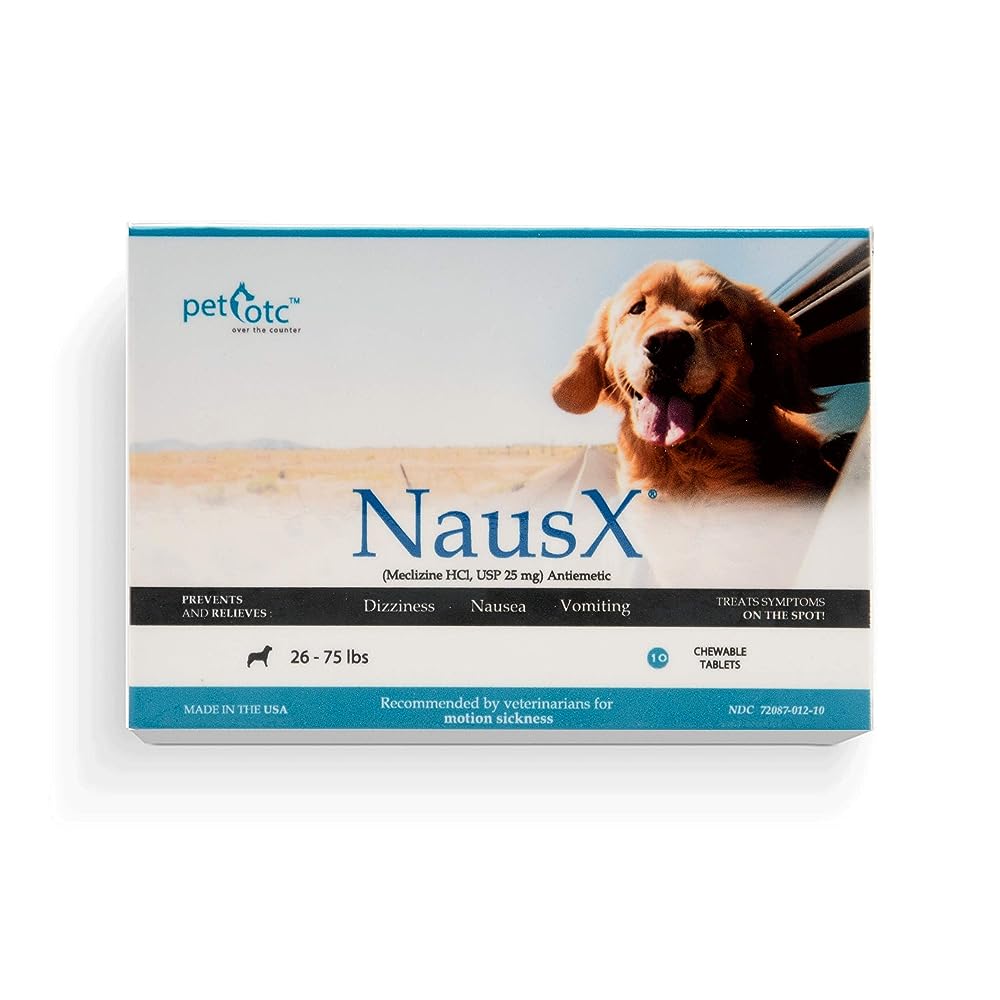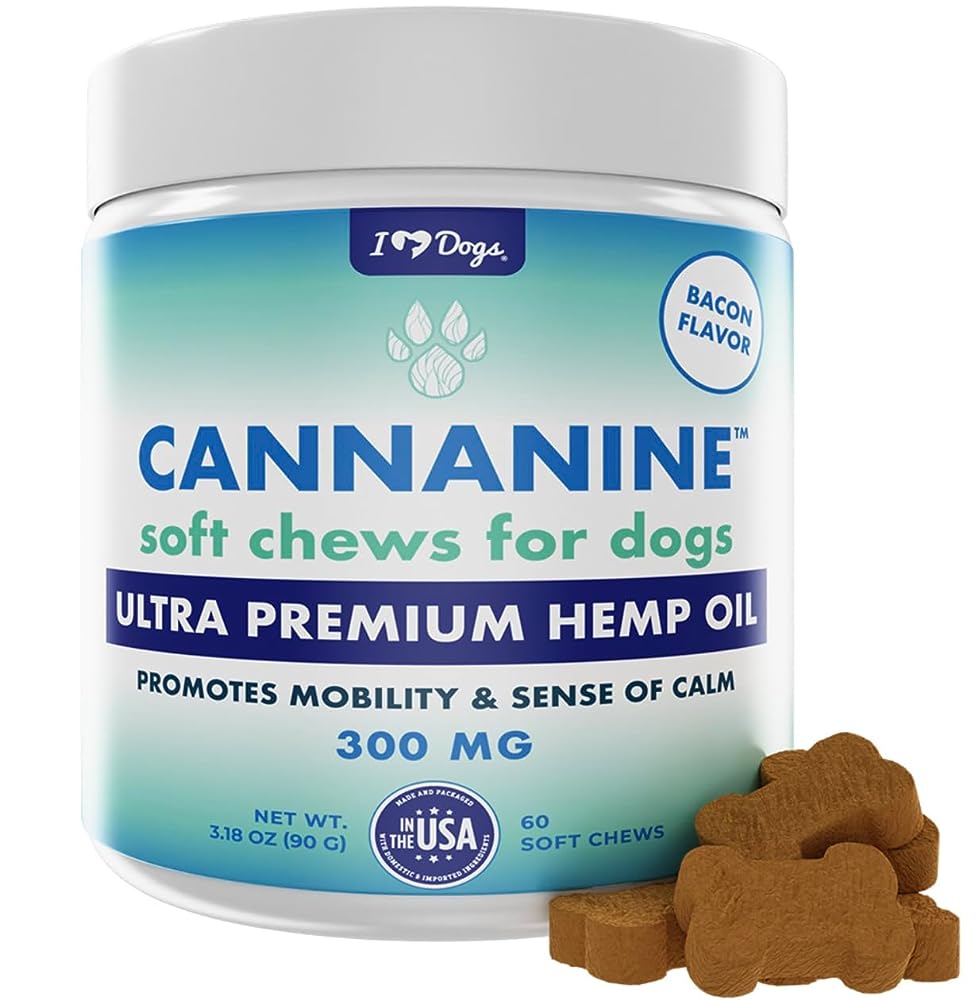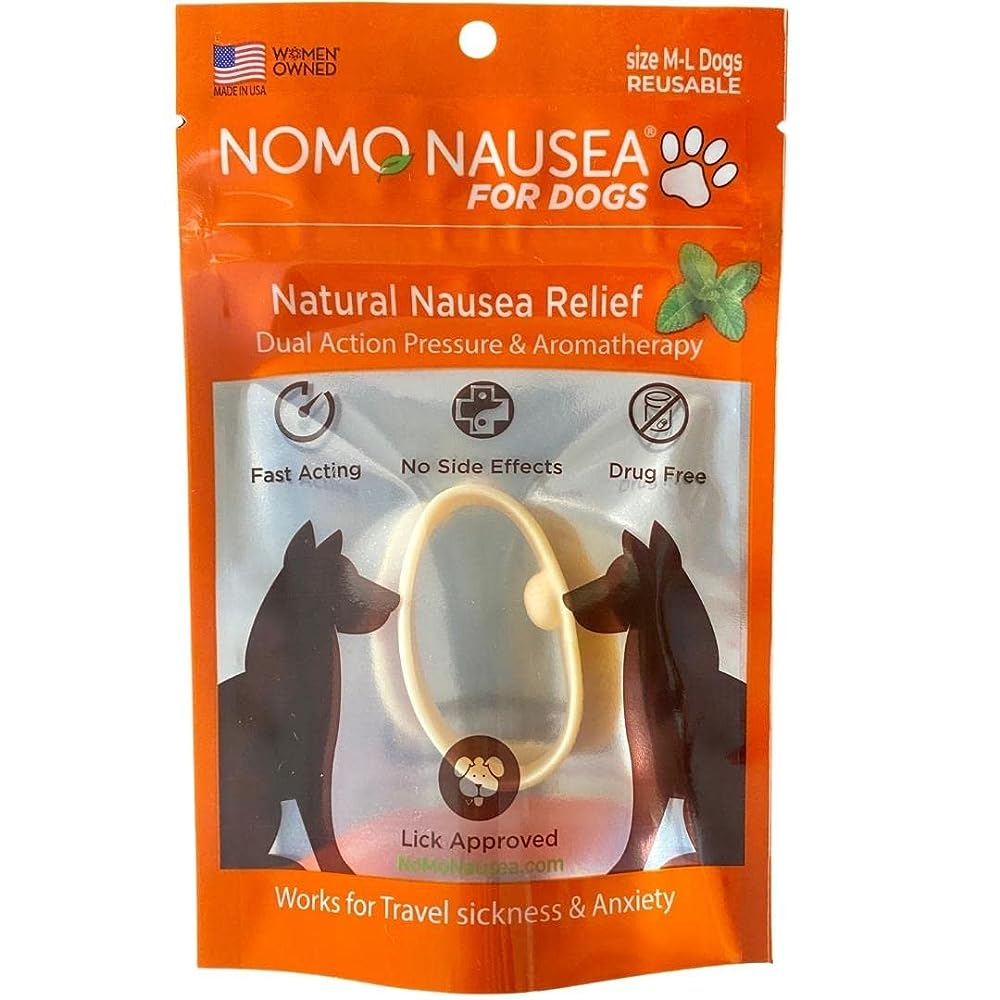iHeartDogs is reader supported. Some of the links below may be paid affiliate links, where we receive a small commission on a product at no additional cost to you.
For many pet owners, seeing their beloved canine companion suffer from nausea is both distressing and concerning. Whether the cause is motion sickness during car rides or an upset stomach from a dietary indiscretion, finding an effective solution is paramount. Thankfully, the market offers a range of dog anti-nausea products designed to alleviate symptoms and promote overall digestive health. This article delves into the best products available, helping dog owners make an informed decision for their furry friend’s well-being.
#1 – Nausx Anti-Motion Sickness & Relief for Dogs, Md
Nausx Anti-Motion Sickness & Relief for Dogs is an effective medication designed to alleviate motion sickness and carsickness in dogs during travel. It is easily digested and does not cause sedation, making it a gentle solution for dogs with sensitive stomachs. The pills are small, odorless, and work quickly to calm stomach upset, providing relief for up to 6-8 hours. This formula is suitable for travel in cars, trains, planes, trucks, and boats, but caution should be exercised when combining it with other medications containing Meclizine. It is recommended to consult a veterinarian before administering any supplements or medications to dogs.

#2 – Tummy – Natural, Electrolyte, Odorless Pet Supplement That Relieves Stomach Pain and Nausea (Dropper, 1 Ounce)
Tummy is a natural pet supplement designed to alleviate stomach pain and nausea in pets. It can be used in conjunction with other supplements for enhanced results, and can be easily administered by adding it to food or water during mealtime. Made with natural electrolytes, vitamins, and minerals, Tummy is odorless and of human-grade quality, ensuring that pets are comfortable taking it.

#3 – iHeartDogs Hemp Calming Chews for Dogs – Dog Anxiety Relief Bites with Hemp – Bacon Flavored Dog Calming Treats for Anxiety and Stress
iHeartDogs Hemp Calming Chews for Dogs are bacon flavored soft chews designed to provide relief from anxiety and stress in dogs. These treats aim to promote a sense of calm in dogs while also helping to improve natural joint mobility. They have undergone 3rd party testing and are approved by the Clean Label Project.

#4 – NOMO Bands Anti Nausea for Dogs | Pet Calming Wristbands for Car Sickness | Peppermint Scented Dog Motion Sickness Relief with Gentle Acupressure | Medium to Large Dogs | Nude | Single Pack
The NOMO Bands Anti Nausea for Dogs is a drug-free solution for dogs who experience car sickness, post-surgical nausea, and anxiety-induced nausea. The band uses peppermint aromatherapy to instantly calm dogs and prevent upset stomachs and vomiting. The band also provides long-lasting relief for over 12 hours and is easy to use and comfortable for dogs to wear. It is designed specifically for medium to large dogs weighing 50 lbs and above.

#5 – Vitalize Alimend K9 – Dog Upset Stomach Relief for Nausea, Vomiting & Diarrhea – 6 Oz
The Vitalize Alimend K9 is a dog supplement designed to provide 24/7 stomach comfort and protection for dogs experiencing upset stomachs, vomiting, and diarrhea. The ingredients in this supplement work with the dog’s biology to improve gastric health and enhance digestion and nutrient absorption, leading to improved immunity and coat health. This product is especially suitable for dogs vulnerable to stomach discomfort, such as senior dogs or those on NSAIDs prone to gastric ulcers. It is safe for routine and continuous use in all types of dogs and does not alter stomach pH.

#6 – Dinovite Probiotic Supplement for Dogs – Omega 3 for Dogs – Hot Spot Relief – Skin & Coat Supplement for Dogs – 90 Day Supply for Small Dogs (1.76 lbs)
The Dinovite Probiotic Supplement for Dogs is a daily supplement that supports digestion, gut health, and a healthy immune system in dogs. It contains essential prebiotics and probiotics to maintain a healthy gut, as well as omega fatty acids to promote healthy skin and coat. Additionally, it helps tackle common issues like itching, hot spots, licking, and seasonal allergies. The product comes with a 90-day guarantee, promising results or a refund.

What Products Can Help My Dog’s Nausea?
Certainly! Nausea in dogs can arise from various causes, including motion sickness, digestive upset, or as a side effect of medications. Addressing canine nausea promptly is crucial to ensure your dog’s comfort and overall well-being. Here’s a brief rundown of products that can help:
- Over-the-Counter (OTC) Medications: Some human OTC medications, like Dramamine (dimenhydrinate) or Benadryl (diphenhydramine), can be used for dogs, but always consult your veterinarian for the right dosage and to ensure it’s safe for your specific dog.
- Prescription Medications: There are medications like Cerenia (maropitant citrate) specifically designed for dogs to prevent vomiting caused by motion sickness or other reasons.
- Ginger: Ginger has natural anti-nausea properties and can be given in small amounts or in the form of a supplement. There are even dog treats available with ginger as an ingredient.
- Probiotics: These can help balance the gut flora, especially if the nausea is due to digestive upset.
- Dietary Adjustments: Feeding easily digestible foods or special prescription diets can be helpful if the nausea is food-related. Bland diets, like boiled chicken and rice, can be beneficial temporarily.
- CBD Oil: Some pet owners have found relief for their pets using CBD oil, which can help with nausea and increase appetite. It’s essential to use a product specifically formulated for pets and consult your veterinarian first.
- Herbal Supplements: There are certain herbal blends, like slippery elm or peppermint, that can soothe an upset stomach.
- Pheromone Therapy: Products like Adaptil can sometimes help if the nausea is stress-related, as they release calming dog pheromones.
- Acupressure or Acupuncture: Some dogs benefit from these holistic treatments, which are believed to help with a variety of ailments, including nausea.
- Hydration: If a dog is vomiting or has diarrhea alongside nausea, it’s essential to ensure they stay hydrated. Electrolyte solutions like Pedialyte (diluted) can help, but consult your vet for recommendations.
Remember, while these products and solutions can be effective, the cause of the nausea should be determined and addressed. Chronic or severe symptoms require immediate veterinary attention. Always consult with a veterinarian before administering any treatment or making changes to your dog’s diet.
What Strategies Can I Use to Keep My Dog from Feeling Nausea?
Certainly! Nausea in dogs can be unsettling for both the pet and the owner. Fortunately, there are several strategies you can employ to help reduce or prevent this discomfort:
- Dietary Management: Feed your dog a balanced, easily digestible diet. If you’re changing their food, do so gradually over several days to prevent gastrointestinal upset. Smaller, more frequent meals can also help reduce nausea, especially in dogs prone to stomach issues.
- Motion Sickness: If your dog gets nauseated during car rides, consider:
- Fasting: Avoid feeding your dog for a few hours before the trip.
- Positioning: Some dogs do better when facing forward in the car, so consider a dog seat or harness to keep them in position.
- Acclimation: Take your dog on short car rides, gradually increasing the distance to help them get used to the motion.
- Window Ventilation: Fresh air can help, but avoid letting them stick their head out, as this can be dangerous.
- Medications and Supplements:
- Over-the-counter (OTC) medications: After consulting with your veterinarian, you might consider giving your dog medications like Dramamine or Benadryl.
- Prescription medications: Your veterinarian might prescribe medications specifically for canine nausea or motion sickness, like Cerenia.
- Natural supplements: Ginger, in small amounts or supplements, can be effective due to its natural anti-nausea properties.
- Hydration: Ensure your dog remains hydrated, especially if they’re vomiting. Offering ice cubes or a diluted electrolyte solution can help keep them hydrated without exacerbating the nausea.
- Reduce Stress: If your dog’s nausea is stress-induced, create a calm environment. This can include:
- Calming supplements or chews: Many products contain natural ingredients like chamomile or L-theanine which can reduce anxiety.
- Pheromone sprays or diffusers: These mimic calming dog pheromones and can help reduce stress.
- Comfort items: Providing familiar toys or blankets can soothe a nervous dog.
- Probiotics: These can help maintain a balanced gut flora, potentially reducing instances of digestive upset.
- Limit Table Scraps: Human food can be too rich or spicy for a dog’s stomach, potentially causing nausea or more severe digestive issues.
- Avoid Rapid Activity After Eating: Just as humans can feel queasy after eating and then immediately being very active, the same can happen for dogs. Allow some downtime after meals.
- Monitor for Toxins: Ensure your dog doesn’t ingest harmful substances, plants, or foods, many of which can induce nausea.
- Regular Veterinary Check-ups: Some causes of nausea might be due to underlying health issues. Regular check-ups can help diagnose and address these problems early on.
While these strategies can help manage and prevent nausea, always observe your dog for any recurrent or severe symptoms and consult with a veterinarian regarding the best approach for your individual pet.
Frequently Asked Questions About Anti-Nausea Products for Dogs
- What causes nausea in dogs? Nausea in dogs can be caused by various factors, including motion sickness, dietary indiscretion, ingestion of toxic substances, gastrointestinal illnesses, or other underlying health conditions. It’s essential to identify the root cause for effective treatment.
- Are over-the-counter human anti-nausea medications safe for dogs? Some human anti-nausea medications might be safe for dogs in appropriate doses, like Dramamine or Benadryl. However, always consult your veterinarian before giving any medication to your dog to ensure safety and correct dosage.
- How does Cerenia work for dog nausea? Cerenia (maropitant citrate) is a prescription medication specifically designed for dogs to treat and prevent vomiting. It works by blocking the vomiting signal to the brain, providing relief from nausea and preventing vomiting.
- Can natural remedies help with dog nausea? Yes, natural remedies like ginger or chamomile can sometimes help alleviate nausea symptoms in dogs. However, it’s essential to ensure the dosage is appropriate for your dog and check for any potential allergic reactions.
- What dietary changes can help reduce my dog’s nausea? Feeding easily digestible foods, avoiding rich or fatty foods, and transitioning slowly when changing diets can help. Additionally, smaller, more frequent meals can help manage and prevent nausea in some dogs.
- Can probiotics help with my dog’s digestive issues and nausea? Yes, probiotics can promote a healthy gut flora, which can help manage and prevent digestive issues that might lead to nausea. Consult your vet for the right probiotic supplement for your dog.
- How do I know if my dog’s nausea is severe? If your dog experiences frequent vomiting, dehydration, lethargy, or shows signs of distress along with nausea, it’s essential to consult a veterinarian. These could be symptoms of a more serious underlying issue.
- Are there side effects to anti-nausea medications for dogs? Like all medications, anti-nausea drugs can have side effects, though they are generally well-tolerated. Common side effects might include drowsiness or diarrhea. Always monitor your dog after administering medication and consult your vet with any concerns.
- How can I prevent motion sickness in my dog during car rides? Acclimating your dog to car rides, using special dog car seats, ensuring proper ventilation, and considering fasts or feeding lighter meals before travel can help. There are also medications and supplements designed specifically to prevent motion sickness.
- What other strategies can I use alongside anti-nausea products to comfort my nauseous dog? Creating a calm environment, ensuring hydration, offering ice cubes, and using calming supplements or toys can help soothe a dog experiencing nausea. Always ensure your dog is comfortable and monitor for signs of worsening symptoms.
Related: The 10 Best Anti-Anxiety Beds for Dogs
Conclusion: Best Dog Anti-Nausea Products
Navigating the vast world of pet health products can sometimes feel overwhelming, but when armed with knowledge and recommendations, choosing the right anti-nausea solution for your dog becomes a smoother process. Prioritizing your pet’s comfort and health is always the ultimate goal, and with the right product in hand, you can ensure those car rides, dietary changes, or mild stomach upsets are tackled effectively. Always remember to consult with your veterinarian before making any significant changes to your dog’s healthcare regimen. Your furry friend deserves the best, and with the right care, you can guarantee they live a happy, nausea-free life.
iHeartDogs is reader supported. Some of the links below may be paid affiliate links, where we receive a small commission on a product at no additional cost to you.
- Best Joint Supplement for Dogs
- Best CBD Gummies for Dogs
- Goat's Milk for Dogs
- Skin & Coat Supplements for Dogs
- Weight Gain Supplements for Dogs
- Muscle Building Supplements for Dogs
- Heart Supplements for Dogs
- Multivitamins for Dogs
- Pill Pockets for Dogs
- Digestive Enzymes for Dogs
- Turmeric for Dogs
- Liver Supplements for Dogs
- Tear Stain Supplement for Dogs
- Breath Fresheners for Dogs
- Kidney, Urinary, & Bladder Supplements for Dogs
- Stool Eating Deterrent for Dogs
- Eye Supplements for Dogs
- Melatonin for Dogs
- Apple Cider Vinegar for Dogs
- Green Lipped Mussels for Dogs
- L Theanine for Dogs
- Chondroitin Supplements for Dogs
- MSM for Dogs
- Valerian Root for Dogs
- Chamomile for Dogs
- Boswellia for Dogs
- L Tryptophan for Dogs
- Yucca for Dogs
- Licorice Root for Dogs
- Bromelain for Dogs
- Papain for Dogs
- Devil's Claw for Dogs
- Quercetin for Dogs
- Hemp gummy for dogs
- Best Hemp Dog Treats
- Best Hemp Oil for Dogs
- Best Calming Treats, Chews, & Supplements for Dogs
- Best Bone Broth for Dogs
- Best Fish Oil for Dogs
- Best Probiotics for Dogs
- Best Hip Dysplasia Supplements for Dogs
- Best Colostrum for Dogs
- Best Quercetin for Dogs
- Best Greens for Dogs Supplements
- Best Vitamin C Supplements for Dogs
- Best Probiotic for Dog with Allergies
- Best Taurine Supplements for Dogs
- Best Dog Food Toppers
- Best Anal Gland Supplement for Dogs
- Best Dog Probiotic Powder
- Best CoQ10 Supplement for Dogs
- Best Liquid Glucosamine for Dogs
- Best Wrinkle Creams, Balms, and Wipes for Dogs
- Best Puppy Calming Treats
- Best Colloidal Silver for Dogs
- Best Adaptogen Supplements for Dogs
- Best Cognitive Supplements for Dogs
- Best Bee Pollen for Dogs
- Best Vitamin A Supplements for Dogs
- Best Vitamin E Supplements for
- Best Liquid Glucosamine Supplements for Dogs
- Best SAM-e Supplements for Dogs
- Best Hyaluronic Acid Supplements for Dogs
- Best Apple Cider Vinegar Supplements for Dogs
- Best Diarrhea Medicine for Dogs
- Best Milk Thistle for Dogs
- Best Turkey Tail Mushroom Supplements for Dogs
- Best Astaxanthin Supplements for Dogs
- Best Lutein Supplements for Dogs
- Best Electrolyte Supplements for Dogs
- Best Coconut Oil for Dogs
- Best Prenatal Vitamins for Dogs
- Best Puppy Milk Replacements
- Best Iron Supplements for Dogs
- Best Dewormer Products for Dogs
- Best Mange Medications for Dogs
- Best Cough Relief Products for Dogs
- Best Sinus Relief Products for Dogs
- Best Collapsed Trachea Supplements for Dogs
- Best Fireworks Anxiety Relief Products for Dogs
- Best Thunderstorm Anxiety Relief Products for Dogs
- Best Travel Anxiety Relief Product for Dogs
- Best Supplements for a Dog with a Torn ACL
- Best Supplements for a Dog with Patellar Luxation
- Best Supplements for a Dog with Intervertebral Disc Disease
- Best Zinc Supplements for Dogs
- Best Biotin Supplements for Dogs
- Best Tart Cherry Supplements for Dogs
- Best Resveratrol Supplements for Dogs
- Best Ginkgo Biloba Supplements for Dogs
- Best Ashwagandha Supplements for Dogs
- Best Supplements for Dogs with Cushing's Disease
- Best Adrenal Supplements for Dogs
- Best NAD+ Supplements for Dogs
- Best NMN Supplements for Dogs
- Best Supplements for Dogs with Dementia
- Best Supplements for Dogs with CCD(Canine Cognitive Dysfunction)
- Best Fiber Supplements for Dogs
- Best Spirulina for Dogs
- Best Hairball Remedies for Dogs
- Best Eye Drops for Dogs with Allergies
- Best Magnesium Supplements for Dogs
- Best Brushes for Double-Coated Dogs
- Best Dandelion Root Supplements for Dogs
- Best Probiotic for Dogs with Yeast Infections
- Best Flaxseed Oil for Dogs
- Best Chamomile Supplements for Dogs
- Best Lavender Supplements. Treats & Sprays for Dogs
- Best Collagen Supplements for Dogs
- Best Kelp Supplements for Dogs
- Best Activated Charcoal for Dogs
- Best Slippery Elm Supplements for Dogs
- Best Supplements for Dogs with Seizures & Epilepsy
- Best Antioxidant Supplements for Dogs
- Best Ubiquinol Supplements for Dogs
- Best Hormone & Glandular Supplements for Dogs
- Best Thyroid Supplements for Dogs
- Best Iodine Supplements for Dogs
- Best Dog Shedding Supplements for Dogs
- Best Detox Supplements for Dogs
- Best Postbiotics for Dogs
- Best Aspirin Products for Dogs
- Best Dog Anti-Nausea Products
- Best Dog Mouthwashes
- Best Camelina Oils for Dogs
- Best Hemp Seed Oils for Dogs
- Best Natural Anti-Inflammatories for Dogs
- Best Cancer Supplements for Dogs
- Best Sardine & Anchovy Oils for Dogs
- Best Fatty Acid Supplements for Dogs
- Best Chia Seed Supplements & Treats for Dogs
- Best Olive Oils for Dogs
- Best Amino Acid Supplements for Dogs
- Best Moringa Supplements for Dogs
- Best Echinacea Supplements for Dogs
- Best Cranberry Supplements for Dogs
- Best D-Mannose Supplements for Dogs
- Best Nettle Leaf Supplements for Dogs
- Best Marshmallow Root Supplements for Dogs
- Best Astragalus Supplements for Dogs
- Best Pumpkin Seed Supplement for Dogs
- Best Supplements for a Dog Wetting The Bed
- Best Blueberry Supplement for Dogs
- Best Bromelain Supplements for Dogs
- Best Yucca Supplements for Dogs
- Best Ginger Supplements for Dogs
- Best Rosehip Supplements for Dogs
- Best Allergy Medicines for Dogs
- Best Reishi Mushroom Supplement for Dogs
- Best Maitake Mushroom Supplement for Dogs
- Best Chaga Mushroom Supplement for Dogs
- Best Shiitake Mushroom Supplement for Dogs
- Best Cordyceps Mushroom Supplement for Dogs
- Best Lion's Maine Supplement for Dogs
- Have question? - Ask in our Dog Health Forum
 Toledo, United States.
Toledo, United States.